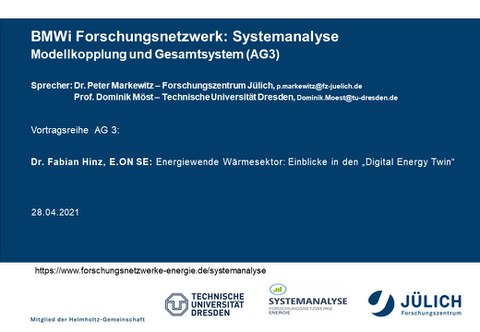Apr 27, 2021
Lecture within the framework of the BMWi research network system analysis
As part of the BMWi research network system analysis, the working group “Model coupling and total energy systems” is holding a series of lectures.
Dr. Fabian Hinz from E.ON SE will give a lecture on the following topic:
"Energy transition in the heating sector: Insights into the" Digital Energy Twin"
Date: 28. April 2021
Time: 16:00 – 17:00
Access: https://tu-dresden.zoom.us/j/85199006039?pwd=TU5lRnR1SFlVSzZnRVFhK3hPQlNTQT09
Participation is possible without registering under the link mentioned.
We cordially invite you to the lecture.
Dr. Peter Markewitz (Research Center Jülich and spokesman for the Model Coupling and Total Energy Systems working group) & Prof. Dr. Dominik Möst (TU Dresden, deputy spokesman for the Model Coupling and Total Energy Systems working group)
Research network system analysis
The Energy System Analysis research network was founded in 2015 to advise the Federal Ministry for Economic Affairs and Energy and stakeholders from research and the energy industry on funding strategies in the areas of digital data processing, data infrastructures and licensing. The aim is to make the modeling tools used more transparent and comparable in terms of scientific quality control.
The members of the research network are divided into five working groups, each dealing with aspects of systems analysis.
This working group “Model Coupling and Total Energy Systems” deals with the use of models on different system levels and their coupling. With the increasingly complex models, the interactions with the technical and socio-economic overall model are also important. The prerequisite for this is that the sectors are resolved and mapped accordingly. Models that depict or describe similar scenarios can be grouped into model families. The working group also deals with the development of tools for cross-domain simulations as well as with modeling in the EU environment and the coupling of partial and energy system models. Methods are also developed to resolve uncertainties in models as well as interfaces to couple different models with one another. In the case of complex couplings, the level of detail of high-resolution models can largely be retained, but the corresponding results can be taken into account in large-scale scenario calculations.

